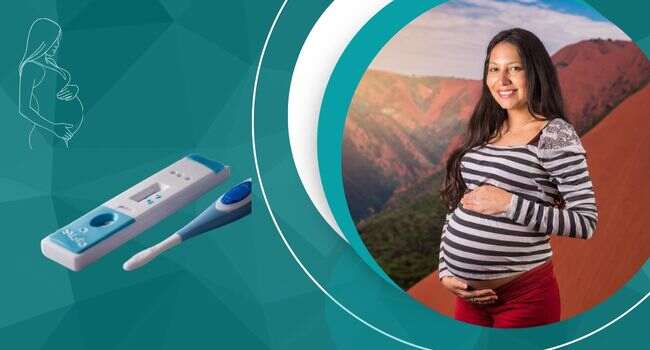Would you like to learn more details about what happens in the pregnancy first week and what signs of pregnancy occur in the first week? In this article, we cover all the details about the pregnancy first week.
Table of Contents
Early Clues of Pregnancy: What to Expect in the Pregnancy First Week?
The pregnancy first week typically begins with the start of your last menstrual period. Conception usually occurs within the first 12 weeks, although the exact time of conception is difficult to determine. Experts consider the length of pregnancy from the first day of the last period to about 40 weeks later.
For many women, conception can occur around 12-14 days before their next expected period. During this time, follicle stimulating hormone (FSH) initiates the development of follicles in the ovaries, where eggs mature. These mature follicles eventually release an egg, a process known as ovulation.
Within the first five days of the menstrual cycle, levels of follicle-stimulating hormone increase, helping follicles continue to mature. A few follicles develop each month until the time of ovulation, ready for fertilization.

When these follicles mature, the production of the estrogen hormone begins in the woman’s body. Estrogen serves two main purposes: it thickens the lining of the uterus to support a potential pregnancy and increases hormone production.
As a result, typically one mature follicle, sometimes two, is released and travels through the fallopian tube, ready for fertilization. This marks the beginning of fertilization or conception, in which an egg can be fertilized by a sperm cell.
There may not be any clear signs of pregnancy during this time, although some women may feel generally fatigued or notice increased urination. Maintain a healthy lifestyle, avoid smoking and drugs, follow medical advice, and take prenatal vitamins regularly. If extreme weakness or unhealthy symptoms occur, consult a doctor immediately. Always seek medical advice regarding supplements and consider taking prenatal multivitamins.
During this time, the egg moves toward the uterus for potential implantation. If fertilization occurs during this journey, the fertilized egg implants in the uterus, marking conception. However, if the egg is not fertilized, it breaks down and is excreted along with some blood during the next menstrual period.
Sperm can survive in a woman’s body for about 5 days, while eggs typically remain viable for 12 to 24 hours after release. Therefore, the most fertile period extends from about 5 days before ovulation to the day of ovulation, with the highest probability of conception occurring on the last day.
During this early period there are usually no clear signs of pregnancy, although some women may feel fatigued or notice changes in urinary habits. Mood swings and seasonal influences can also occur. Maintain a healthy lifestyle, avoid smoking and drugs, and follow medical advice. If extreme weakness or worrisome symptoms occur, consult a doctor immediately. Stick to regular medication and, under medical guidance, consider taking prenatal multivitamins.
Common Pregnancy Week one Symptoms:
There are typically no obvious symptoms during the first week of pregnancy because conception has just begun. However, some women may notice minor symptoms of pregnancy in the first week, such as:
- Spotting: Some women may notice light spotting or pink discharge, known as implantation bleeding, during or around the time of implantation. It is the most important sign of pregnancy in the first week.
- Mild cramps: As the uterus expands, some women may experience mild abdominal cramps.
- Fatigue: Hormonal changes can cause some women to feel unusually tired or exhausted.
- Breast changes: Some women may notice subtle changes in the breast, such as tenderness or tenderness to the touch.
- Mood swings: Hormonal fluctuations can lead to mood swings or changes in emotional state. It is another sign of pregnancy in the first week.
These pregnancy symptoms are very subtle and can easily be attributed to premenstrual preparation or other causes. Additionally, many women experience no noticeable symptoms during the Pregnancy First Week.
Planning a pregnancy requires immediate adjustment to healthy and regular lifestyle habits. It is important to avoid smoking and drug use. While planning your pregnancy, stay in touch with your doctor for guidance, and if you are taking medications, consult your doctor to ensure a safe pregnancy and appropriate care for the baby’s health. Additionally, taking prenatal multivitamins can help prevent birth defects and ensure baby’s health. Folic acid, in particular, helps prevent various types of birth defects, so it is recommended to start taking folic acid in the first three months.
Use tool : pregnancy calculator.
Frequently Asked Questions
What happens during the Pregnancy First Week?
Fertilization usually happens in pregnancy week one, as a sperm fertilizes an egg in the fallopian tube, forming a zygote. The zygote rapidly divides and moves to the uterus for implantation, starting embryonic development.
